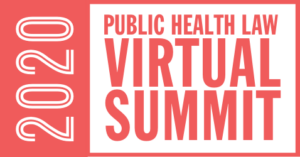
Protecting the Health of Children and Families
Concurrent Session Block 4: 1:15 – 2:15 p.m. ET Thursday, September 17
Presentations
Using SNAP to Address Food Insecurity during the COVID-19 Pandemic
The COVID-19 pandemic has devastated the U.S. economy with over 44 million Americans filing for unemployment by mid-June 2020. This economic devastation is expected to force an additional 17.1 million Americans into food insecurity. Government is adapting key food security programs and implementing new interventions to meet this challenge. This session will examine how the Supplemental Nutrition Assistance Program (SNAP), the nation’s largest nutrition program, is being leveraged during the pandemic. While key adaptations are being made to increase the effectiveness of these programs, this session will also address the additional measures that are needed to protect vulnerable Americans during the pandemic.
- Mathew Swinburne, JD, Associate Director, Network for Public Health Law-Eastern Region
To Open or Not to Open: Deciding How to Educate Children during a Pandemic
State and local governments have struggled with whether and how to allow public, private, and parochial schools to educate in-person during the pandemic. The federal government has offered suggestions for opening safely and pressed for schools to open on schedule. This presentation will survey the varying approaches state and local governments have taken with regard to K-12 education during the pandemic. How has the shared responsibility between state and local jurisdictions functioned? How will schools meet legal requirements for students with disabilities? What have schools put in place to minimize widening of the student achievement gap? Education is a social determinant of health and public health professionals should be part of the conversation and decision making with their colleagues in the education community.
- Kathleen Hoke, Director, Network for Public Health Law—Eastern Region Office